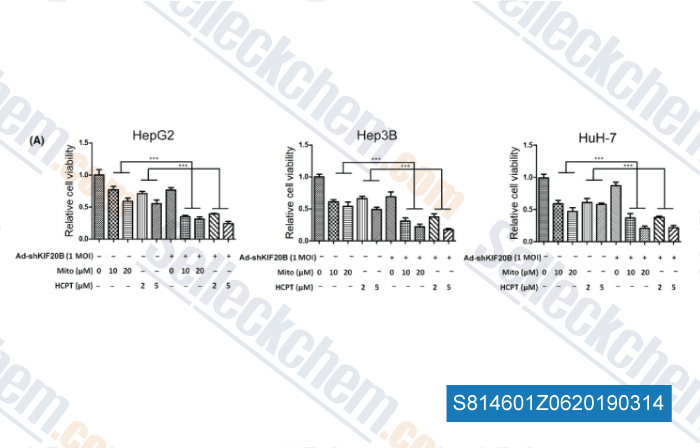|
Toll Free: (877) 796-6397 -- USA and Canada only -- |
Fax: +1-832-582-8590 Orders: +1-832-582-8158 |
Tech Support: +1-832-582-8158 Ext:3 Please provide your Order Number in the email. |
Technical Data
| Formula | C15H18N4O5 |
|||
| Molecular Weight | 334.37 | CAS No. | 50-07-7 | |
| Solubility (25°C)* | In vitro | DMSO | 66 mg/mL (197.38 mM) | |
| Water | Insoluble | |||
| Ethanol | Insoluble | |||
|
* <1 mg/ml means slightly soluble or insoluble. * Please note that Selleck tests the solubility of all compounds in-house, and the actual solubility may differ slightly from published values. This is normal and is due to slight batch-to-batch variations. * Room temperature shipping (Stability testing shows this product can be shipped without any cooling measures.) |
||||
Preparing Stock Solutions
Biological Activity
| Description | Mitomycin C (Ametycine) is an antineoplastic antibiotic by inhibiting DNA synthesis, used to treat different cancers. Mitomycin C induces apoptosis in a caspases-dependent and Fas/CD95-independent manner.This product is a hazardous chemical (acute toxicity/flammable/skin corrosive). Please use it while wearing a protective face mask, gloves, and clothing. | |
|---|---|---|
| Targets |
|
|
| In vitro | Mitomycin C, by inducing DNA interstrand crosslinks, physically blocks DNA replication, recombination, and RNA transcription. [1] Mitomycin C potentiates TRAIL-induced apoptosis in HCT116 (p53-/-) colon cancer cells and sensitizes TRAIL-resistant colon cancer cells HT-29 to the cytokine by through JNK-independent upregulation of death receptors. [2] In different human cancer cell lines, such OVCAR-5 (ovary), HT-29 (colon), SK-N-MC (neuroblastoma), HEP-2 (liver), COLO-205 (colon), NIH-OVCAR-3 (ovary) and A-549 (lung) cells, Mitomycin C shows cytotoxic activity. [3] |
|
| In vivo | As the clinical first choice in superficial bladder tumors, in a rat bladder tumor model, Mitomycin C (400 μM) significantly prevents intravesical tumor growth. [4] |
Protocol (from reference)
| Cell Assay: |
|
|---|---|
| Animal Study: |
|
References
Customer Product Validation

-
Data from [Data independently produced by , , Cancer Sci, 2018, 109(11):3450-3460]
Selleck's Mitomycin C has been cited by 135 publications
| Mechanism of hsa_circ_0069443 promoting early pregnancy loss through ALKBH5/FN1 axis in trophoblast cells [ iScience, 2025, 28(1):111608] | PubMed: 39868042 |
| CRISPR screening uncovers nucleolar RPL22 as a heterochromatin destabilizer and senescence driver [ Nucleic Acids Res, 2024, gkae740] | PubMed: 39258545 |
| Identifying squalene epoxidase as a metabolic vulnerability in high-risk osteosarcoma using an artificial intelligence-derived prognostic index [ Clin Transl Med, 2024, 14(2):e1586] | PubMed: 38372422 |
| High-throughput drug screening identifies novel therapeutics for Low Grade Serous Ovarian Carcinoma [ Sci Data, 2024, 11(1):1024] | PubMed: 39300112 |
| CCR5-overexpressing mesenchymal stem cells protect against experimental autoimmune uveitis: insights from single-cell transcriptome analysis [ J Neuroinflammation, 2024, 21(1):136] | PubMed: 38802924 |
| TSPAN6 reinforces the malignant progression of glioblastoma via interacting with CDK5RAP3 and regulating STAT3 signaling pathway [ Int J Biol Sci, 2024, 20(7):2440-2453] | PubMed: 38725860 |
| Elucidation of the pluripotent potential of bovine embryonic lineages facilitates the establishment of formative stem cell lines [ Cell Mol Life Sci, 2024, 81(1):427] | PubMed: 39377807 |
| Culture and expansion of murine proximal airway basal stem cells [ Stem Cell Res Ther, 2024, 15(1):26] | PubMed: 38287366 |
| Establishment, characterization, and biobanking of 36 pancreatic cancer organoids: prediction of metastasis in resectable pancreatic cancer [ Cell Oncol (Dordr), 2024, 10.1007/s13402-024-00939-5] | PubMed: 38619751 |
| Enhanced anti-tumor efficacy of electroporation (EP)-mediated DNA vaccine boosted by allogeneic lymphocytes in pre-established tumor models [ Cancer Immunol Immunother, 2024, 73(12):248] | PubMed: 39358555 |
RETURN POLICY
Selleck Chemical’s Unconditional Return Policy ensures a smooth online shopping experience for our customers. If you are in any way unsatisfied with your purchase, you may return any item(s) within 7 days of receiving it. In the event of product quality issues, either protocol related or product related problems, you may return any item(s) within 365 days from the original purchase date. Please follow the instructions below when returning products.
SHIPPING AND STORAGE
Selleck products are transported at room temperature. If you receive the product at room temperature, please rest assured, the Selleck Quality Inspection Department has conducted experiments to verify that the normal temperature placement of one month will not affect the biological activity of powder products. After collecting, please store the product according to the requirements described in the datasheet. Most Selleck products are stable under the recommended conditions.
NOT FOR HUMAN, VETERINARY DIAGNOSTIC OR THERAPEUTIC USE.
